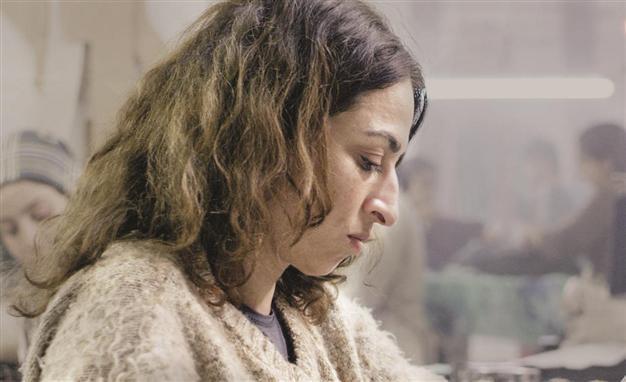‘The Particle’: An ode to working class women
Emrah Güler ANKARA - Hürriyet Daily News

‘Zerre’ focuses on Zeynep as she tries to make ends meet on her own, taking care of her mother and her daughter. Their struggle comes to a peak when Zeynep is fired from the textile mill she is working in.
It doesn’t get lonelier and more suffocating than the protagonist Zeynep’s life in the recently released feature “Zerre” (The Particle). Not in life, and not in movies. “How much space does Zeynep take up in this vast universe?” asks in the info sheet for the movie. “This is a city brimming with the struggling and the unemployed. Aren’t their lives a bit like the infinite, tiny particles flying through the air?” Hence the title of the movie.
Through its leading character Zeynep (Jale Arıkan), director and writer Erdem Tepegöz moves through the underbellies of Istanbul. The dispersed particles he clings to strongly as a metaphor are the inhabitants of the city’s underbellies. The unemployed, the underpaid, the unqualified, those who have come to Istanbul with big dreams, only to have their dreams crushed in ways they could never have imagined.
The setting is Tarlabaşı, the controversial face of an urban renewal project for seven years now. Within walking distance of Taksim, the heart of İstanbul, Tarlabaşı the home to migrants with low-income to no jobs, mostly coming from eastern Turkey, as well as the marginalized communities like the Roma people or the LGBT.
Tarlabaşı has become the epitome of what could go wrong with a metropolitan centre. Overpopulation, migration, class differences, rise in crime, gentrification, a disregard for historical architecture, and the tragic living conditions of the working class are all embodied in an area of five acres. The inspiration for the story of Tepegöz’s debut feature had, in fact, come while he was visiting the area for another project. A brief encounter with a woman living in a crumbled building eventually led to Zeynep’s story in “Zerre.”
The film focuses on Zeynep as she tries to make ends meet on her own, taking care of her mother and her daughter. Their struggle comes to a peak when Zeynep is fired from the textile mill she is working in. The film, then, follows Zeynep as she tries to find a menial job, finding one outside the city, and as she moves from one suffocating existence to an even more suffocating one.
Different shades of greyThis is a film not of a linear narrative but of mood, imagery and metaphors. The downward spiral that is Zeynep’s life is told through dust particles reflected through light in the dark, a dog chewing on meat, Zeynep watching herself in the cracked mirror, and as she walks the streets of an İstanbul that looks as appealing and colorful as Zeynep’s life.
The colors in “Zerre” are, in fact, different shades of grey. The streets, the locations and the extras look harrowingly real. Because they are real, bordering on documentary in some scenes. As we delve deep into Zeynep’s story through the melancholy-strewn storytelling of Tepegöz, we feel more and more claustrophobic in the deadlock of Zeynep’s world. Marton Miklauzic’s cinematography and Arıkan’s assured acting add momentum to the effect Tepegöz is trying to achieve with “Zerre.”
The film was one of the favorite ones in last year’s Golden Orange Film Festival in Antalya, going on to win Best Debut, Best Director (earning Tepegöz the youngest recipient of this award), Best Art Director, as well as the Turkish Film Critics’ Association’s Best Film awards.
The humble director Erdem Tepegöz is originally from the Aegean city of İzmir, completing his university education there, and later completing a filmmaking workshop in Prague before moving to İstanbul. If his debut feature is any indication, İstanbul isn’t the enchanting city it’s made out to be for Tepegöz, it is a source of suffocation as people are reduced to mere particles.
Tepegöz has said that the film is “an ode to the working class, their silence and their suppression.” It is also an ode to women, their silence and their suppression. In its heart, “Zerre” is a women’s film, showing the strength, the coping mechanisms, and a sense of empowerment women find in most unlikely places as few other male directors do. Welcome to a great director in the making.
